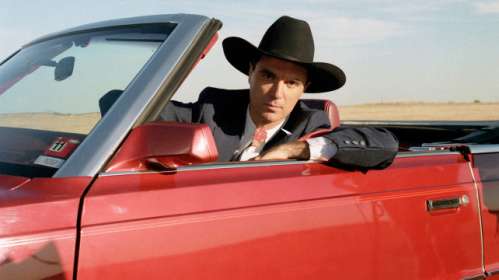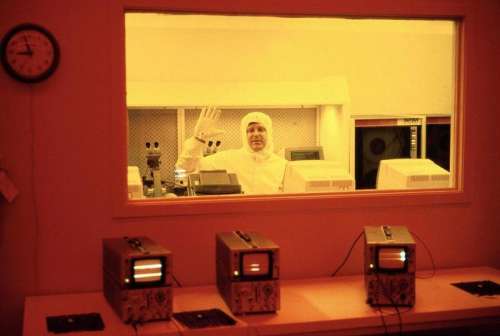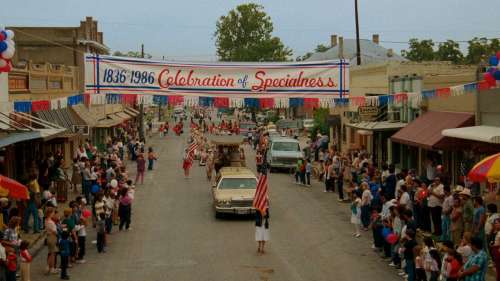Blu-ray Review: At Last, American Masterpiece ‘True Stories’ Gets The Home Release It Has Earned
Via Forbes

By Luke Y. Thompson
You might never have seen True Stories, but chances are you've seen or heard something that was influenced by it.
The 1986 movie that on paper reads like basically a vanity project for Talking Heads lead singer David Byrne -- following the $5 million success on a $1.2 million budget of the band's concert movie Stop Making Sense -- only made about half what his band's movie had, at $2.5 million, but its legacy has lived on. Before the Coen brothers used the music of Meredith Monk or the acting talents of John Goodman, Byrne used both, giving Goodman his first leading role. Before Napoleon Dynamite gave us harmless eccentrics delivering uniquely weird deadpan against wide open skies, True Stories was there. If you enjoyed Twin Peaks' Agent Cooper driving into town with slicked black hair and impeccable suit while narrating every little detail to an unseen audience of Diane, watch Byrne do the same thing (directed at viewers, rather than Diane) first in the fictional town of Virgil, Texas. And hey, you know that band Radiohead? They're named after a song on this film's soundtrack.
True Stories is now out on Criterion Collection Blu-ray and DVD, in widescreen for the first time ever on home entertainment format, as previous VHS and DVD versions were full-frame pan-and-scan. It hasn't been screened much publicly, due to high print rental fees from Warner Bros., so unless you were lucky enough to catch it theatrically on first run, this is probably your first chance to actually view the movie the way it was meant to be seen. I was living in Ireland when the movie initially opened, and recall the newspaper critic calling it not only the best movie he'd seen all week, but maybe the best movie he'd seen all year. I'm prepared to go further, and say it's maybe one of the best movies about America of all time.
It's a tough movie to describe: what I tried to explain to my wife turned out to be not at all what she heard. Byrne, who has never directed another film since, probably because it's a tough act to follow, calls it a musical comedy, which it is, and the loose premise is that several characters based on stories Byrne read in the Weekly World News all live in the same small town and are preparing for a Texas statehood anniversary celebration. But it's somehow less and more than that. Less, because the story isn't all that concerned with a driving narrative, and more because its portrait of life among the weird is at once pin-pointingly specific and thoroughly universal. There is nothing special about Virgil, Texas, says Byrne's narrator, and yet everything in it is special. But as he ultimately concludes, we forget, and sometimes have to come to town again with fresh eyes. There are definite echoes of the Thornton Wilder's Our Town, and parallels to the darker Americana of David Lynch, whose Blue Velvet came out the same year. But where Lynch finds menace in the weirdness and routine, Byrne finds someone -- many someones -- to love.

The movie begins and ends with a child dancing on an open road: the path to the future, full of possibilities. The opening narration and the closing song over the end credits talk of a history of chaos in Texas, from dinosaurs to natives to Spaniards, white men, and wars both Civil and World, with the hope that it all happened to bring us to a place where everyone with their eccentricities co-exists. At the center of it all is Louis (Goodman), a panda-bear shaped, melancholy fellow who just wants a wife, in a town where every available woman is exceedingly strange.
Byrne serves as our host, and as a character who interacts with the other residents like he's known them forever. He's like an alien studying modern human anthropology, always fascinated and delighted by what he finds. And each new discovery culminates in a musical number, as written by Talking Heads, and usually performed by a new character. One of Byrne's goals was to highlight all the different types of music he found in Texas, from country and modern pop to the sounds of computers popping and humming. Characters are literally put in boxes, in the form of the industrial buildings they work in, but come off as absolutely outside same.
It's striking how timeless a lot of this is. Byrne cast a lot of real people as extras, in some cases to play themselves, and the result in its day was radically integrated and deglamorized. Today, it looks like America. Some of the technology is outdated, but the local megachurch's conspiracies of "puzzling evidence" would feel natural on an Alex Jones radio show today, while the local lip-sync bar looks like any number of modern karaoke watering holes. Delusional liars, people who won't apologize for years, and people who never get out of bed...these feel just as real as they ever did, though Byrne is kinder to them than you or I might be. He has no interest in the prejudices of a small town: white, black, and Latino all get along in Virgil, in a way that sadly feels quaint compared to images the media feeds us today. But then again, maybe that's more puzzling evidence. Or maybe it felt easier (whether or not it actually was) for everyone to get along when Reagan conservatism was the dominant paradigm, and liberal rage against the Gipper didn't really feel all that dangerous.

Whatever the case, True Stories paints a sunny view of Texas, and by extension America, as a land of unusual folks who all manage to coexist so long as their weird ways don't harm anyone else. There's a sense that this is a hard-earned peace, but it also could be a mere snapshot along the path of history, like one of the many still images from which Byrne ultimately derived a screenplay.
Even if this were a bare-bones Blu, it would be worth celebrating, but there's much more. First, the soundtrack: originally, there was a Talking Heads album of the band performing all the songs, and a separate album of incidental score and tunes, but neither included the Talking Heads songs sung by other characters. The new CD included with the Blu-ray rectifies this, with a full soundtrack including three Talking Heads songs, the other songs as sung by the actors, and every other tune heard in the background. Liner notes are printed on a fold-out mini-tabloid printed on newsprint, which is fun (it includes an essay by Spalding Gray, and the original Weekly World News stories) but ultimately annoying. The soundtrack disc has its own cardboard sleeve, and so you have to cram it and the newspaper into the case in a way that could have been rectified by making the jewel box hold two discs, and putting the liner notes on a standard booklet. All the contents are worth it, but just cumbersome.
Then we get a lengthy making-of that includes new interviews with Byrne, a vintage intro, and a 1985 making-of featurette that treats the movie as if it were a documentary, following some of the actors around in character, including Goodman getting a tour of the Dallas house that's reminiscent of Pee-wee Herman's Alamo visit. There's also a featurette on Talking Heads album cover designer Tibor Kalman, and a new short film commissioned by Criterion that revisits some of the locations today (it proves what a difference David Byrne's artful eye makes). Finally, there's the original trailer and even some deleted scenes, which show an older, darker ending rightfully excised, wherein the cuteness-loving woman drops dead of cute overload upon seeing the babies in the parade, and the movie closes with her funeral. There's a lot here for fans, like the fact that True Stories and Repo Man were cast by the same person, and that Byrne originally wanted either Willard Scott or Paul Harvey to play the narrator. Byrne's Scottish parents show up at one point sounding incredibly confused by the whole enterprise.
There's no commentary track by Byrne, but that makes a lot of sense in this case, because the director already offers a running commentary within his own movie. You also wouldn't want too much explanation: as with his songwriting, Byrne comes up with tunes and rhythms first, and words last of all. It's as much symphony as script, but the Brechtian kind that ensures you see the creator's hand, understand where the fourth wall is, and find it accessible to all. Intellectualizing about it is almost beside the point, as this is a movie you feel instinctively. I can't tell you why "Dream Operator" makes me tear up every time, but I know it does. I do want freedom and justice, but in the moment that Louis sings that he doesn't because he'd prefer love, I get it. And I love that from almost any point in Virgil, I can see forever, with a horizon that seems infinite.
Did I awake and find it gone? With Criterion, remember this all over again. Our favorite town.